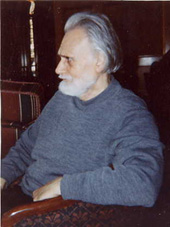Edward Salim Michael had been a composer of symphonic music (which he wrote under his first name Edward). Throughout his books, he always stressed the importance of the role great music has in life and the assistance it can provide in spiritual processes.
“Among all the various arts in the world, music stands out as perhaps the most potent and widely utilized form of expression. Its function and use are highly diverse and its effect and influence on the human psyche truly colossal. (..) The power that music wields in everything and everywhere around can be astonishing. Its force and action on people’s being is at times veritably magical, rendering the composer extremely responsible for what he transmits through his art” (The law of attention chap. 32)
Listen to Edward Salim Michael’s Music
It is possible to listen to some of his pieces on Youtube
What Music should one listen to ?
As many people asked him what sort of music to listen to, Edward Salim Michael indicated the following list of works which can assist and uplift the listener because of their qualities, namely: an inner continuity which the human being does not have ordinarily; compassionate love; devotional aspiration; mystic exaltation; the feeling of mystery; all of which are qualities at the foundation of a spiritual practice and which must be nurtured.
One or more particularly noteworthy movements and sometimes a performer are brought out in parentheses.
Composers are listed in alphabetical order.
| Beethoven | Concerto n° 5 pour piano et orchestre. Triple concerto pour piano (Claudio Arrau), violon et violoncelle Symphonie n° 7 (mouvement lent) Symphonie n° 9 (mouvement lent) |
| Bloch | Service Sacré pour choeur et orchestre Schelomo pour violoncelle et orchestre |
| Brahms | Double concerto pour violon violoncelle (Oistrakh et Rostropovitch) Chants profanes |
| Casals Pablo | La Crèche |
| Chausson | Symphonie |
| Debussy Claude | Trois Nocturnes pour orchestre (Nuages, Fêtes et Sirènes) La Mer Clair de lune (version orchestrale) Extraits du martyr de Saint Sébastien Petite suite (version orchestrale) L’après midi d’un faune Epigraphes antiques (pièces pour piano orchestrées par Ansermet) La cathédrale engloutie (pour piano, orchestré par Stokowski) |
| Elgar | Concerto pour violoncelle et orchestre |
| Dvorak Anton | Sérénade pour orchestre à cordes Danses slaves (George Szell, Cleveland orchestra) Concerto pour violoncelle (Pierre Fournier) et orchestre |
| Dukas Paul | La Péri |
| Franck César | Symphonie Psyché Les Béatitudes |
| Fauré | Requiem |
| Gounod | Messe Sainte Cécile (Bénédictus) |
| Holst Gustav | Les Planètes (Saturne, Neptune) Hymne de Jésus |
| Mahler Gustav | Chants de la Terre Symphonie n°2 (La Résurrection) Symphonie n° 4 (troisième mouvement) Symphonie n° 8 Autres symphonies (mouvements lents) |
| Musique sacrée russe | Credo (par Dmitri Hvorostovsky) |
| Respighi Ottorino | Pins de Rome Fontaines de Rome Triptica Botticelli Danses antiques Vitraux d’église (version orchestrale) |
| Rimsky Korsakov | Symphonie n° 2 : Antar |
| Rosza Miklos | Musique du film Ben Hur |
| Saint Saens | Symphonie n° 3 (3ème mouvement) |
| Satie | Gymnopédies (version orchestrée par Debussy) |
| Sibélius | Le cygne de Tuonela |
| Smetana | La Moldau |
| Strauss Richard | Symphonie alpestre Mort et transfiguration Ainsi parlait Zarathoustra |
| William Vaughan | Fantaisie sur un thème de Thalis pour orchestre à cordes |
| Zemlinsky | Die Seejungfrau pour orchestre |



